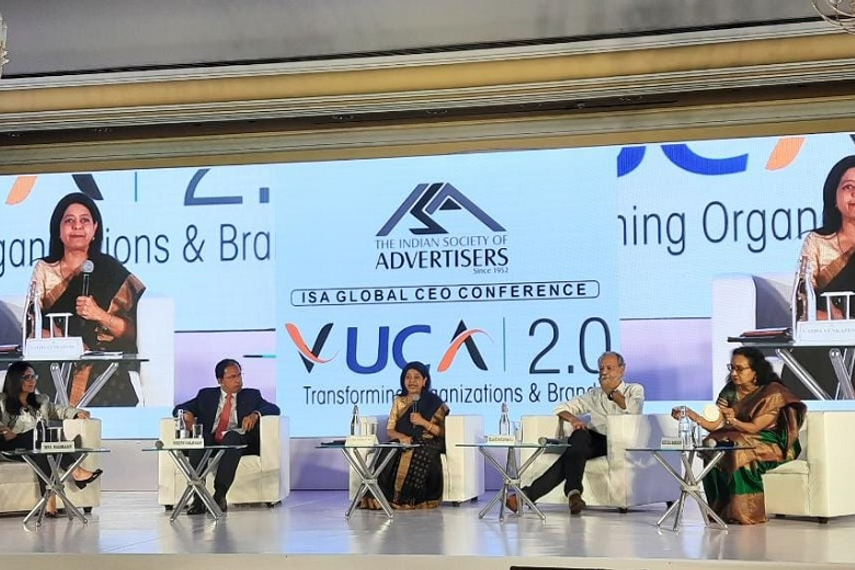Hina Nagarajan, MD and CEO, Diageo India; Renuka Ramnath, founder and MD, Multiples; Shantanu Khosla, MD, Crompton Greaves Electricals; Suresh Narayanan, chairperson and MD, Nestle India, shared how brands and organisations in India can use ‘VUCA 2.0’ to transform themselves at the ISA Global Conference 2022. The moderator for the session was Latha Venkatesh, executive editor, CNBC TV18.
Nagarajan went first to explain how the last few years have changed her approach to marketing.
“Life used to be certain when I started my career. We followed rules like the 4 Ps of marketing and what we learned at business school. Now, I don’t know anything,” she said.
While the last couple of years have seen a shift in how brands have approached the market because of disruptions like the pandemic, Nagarajan stated that the alcohol industry has been used to these changes because of its volatility.
“In the alcohol industry because of all the changes, we’re not at VUCA 2.0 – we have probably reached VUCA 5.0. Because of all these changes we don’t know how the market will change and how consumer demand will change. So, to have an organisation that’s ready for the VUCA world, one must look to be flexible and allocate resources dynamically. Don’t be struck with a certain structure,” she said.
Explaining some of the changes, she said, “India’s a land of opportunity and I’m awestruck with the strides we’ve made in digitisation. In the alcohol industry, I’m amazed to see the shifts that have come about. People are drinking better and so there’s a trend of premiumisation. This was massively accelerated during Covid. It’s hard to imagine these shifts in a two-three year period. We saw a shift in consumption and retail in India became huge. We’ve had stores for alcohol which looked like cages. Now, there’s a full transformation.”
A different VUCA
On the topic, Narayanan stated how he looks at VUCA differently.
He added that the words volatility, uncertainty, complexity, and ambiguity, scare and depress people.
“If you run a business with that kind of attitude, joh VUCA nahi samjhega woh bhuka marega (one who doesn’t understand VUCA will die hungry without any business),” he said.
Narayanan added that he has a different full form for VUCA.
“V is for vision. Whatever the trials, you need to look at the vision. U stands for understanding. I have personally experienced uncertainty. I’ve been through the Maggi crisis. You can’t be phased by uncertainty, you need to have understanding. C stands for certainty. You think you’re paid to be complex, but clarity and simplicity are important. The A stands for adaptability. You have to face the future. The fact of the matter is that to transform organisations, you have to adapt and be agile,” explained Narayanan.
Narayanan also spoke about the importance of leadership to navigate through uncertainty and stated his ‘8 As of leadership’.
-
Authenticity
-
Aspirational
-
Agility
-
Adaptability
-
All-embracing ecosystem
-
Acceptance of failure
-
Actions and outcomes
-
Acknowledge vulnerability
He explained, “You’ll make far better decisions if you keep these in mind. The corporate world and society need this. My message is - form your own role models - be yourselves and start with authenticity.”
Marketing approach during change
While the topic stated ‘VUCA 2.0’, Khosla believed that VUCA has been around since the invention of the wheel.
“Ask Premier Padmani if the world was VUCA. Ask Nokia too. Strangely, people started talking about VUCA when there’s a tough external environment. It doesn’t matter what the environment is – from a marketing point-0f-view, to win in any environment, you need to understand what the consumer wants and deliver it better. It doesn’t matter if commodities are going up and if a pandemic like Covid comes our way,” he said.
His advice was, “People say in tough times, you must eliminate waste. You must stop processes which are bureaucratic and must reduce your costs. But I think you should be doing that either way – during good times or bad times. You have to become adaptable or more agile. You have to empower your teams. To be honest, if you’re doing that in any case, you’ll be in a much better position to leverage tougher times as an opportunity.”
He added, “The fundamentals don’t change. Like a human body, when one gets high blood pressure, you can’t start exercising at that very moment. Keep exercising while you’re young and fit and you’ll never get blood pressure issues. ”
Backing Delhivery over Snapdeal, Flipkart
Ramnath, who is a private equity fund manager, stated how a VUCA world provides an opportunity for her.
Responding to a question from Venkatesh about how she goes about backing the right start-up, she said, “When there’s no VUCA, there’s no business for us. It’s the disruption that gives us the opportunity. Covid accelerated the digital transformation. We look at how much agile management can give value and that value can be invested back into the business, which in turn creates a monopolistic environment.”
Ramnath then explained why she backed and invested in a logistics company like Delhivery.
“In India, e-commerce was the biggest disruption. I was not having the stomach to invest in the likes of Snapdeal or Flipkart because they were capital-guzzling opportunities. We are not that kind of fund. So we did the traditional test and backed the logistics company which was behind Amazon and Flipkart. It didn’t matter which one of the e-commerce players would win, because either way, we would win,” she said.

